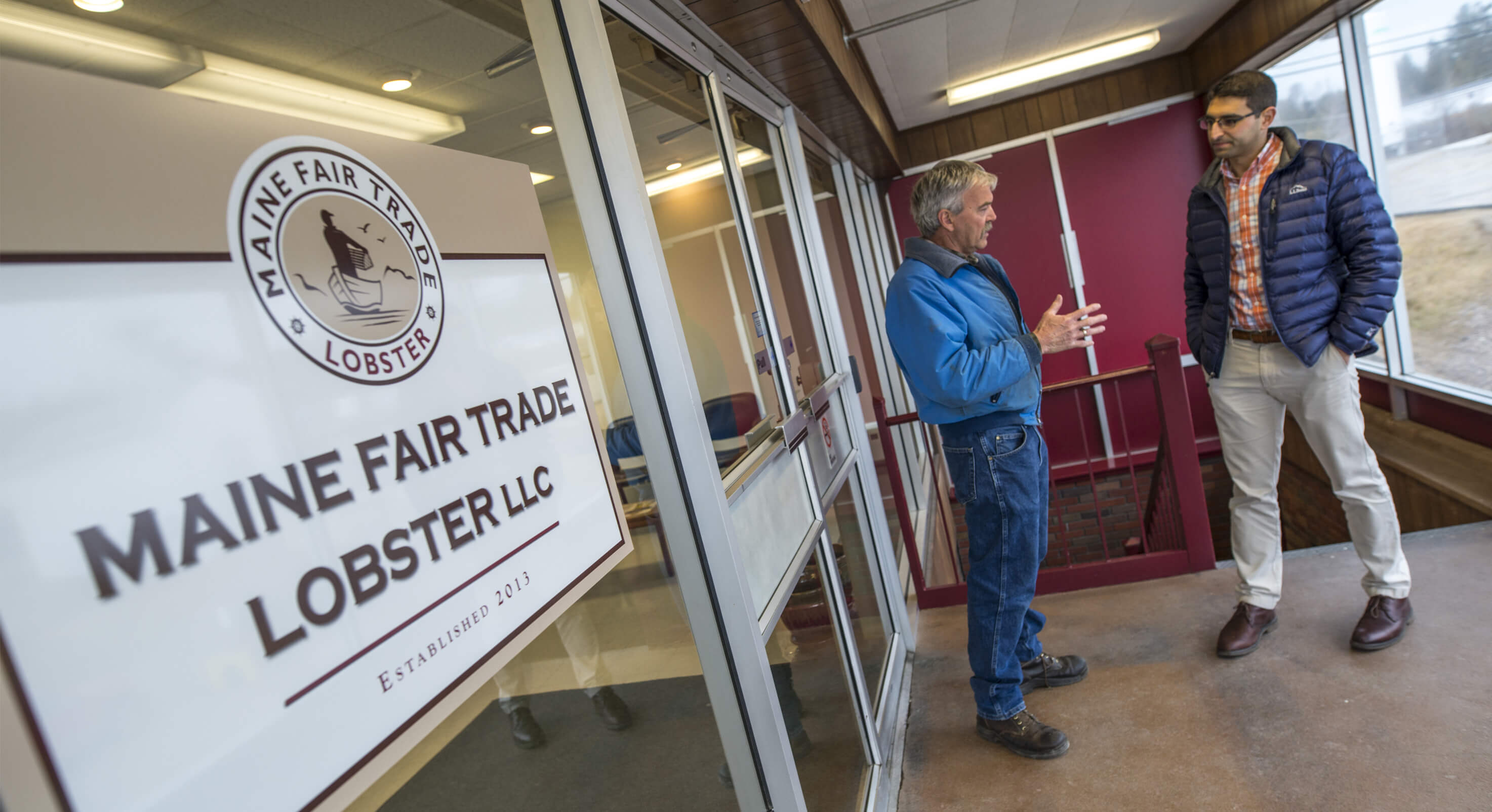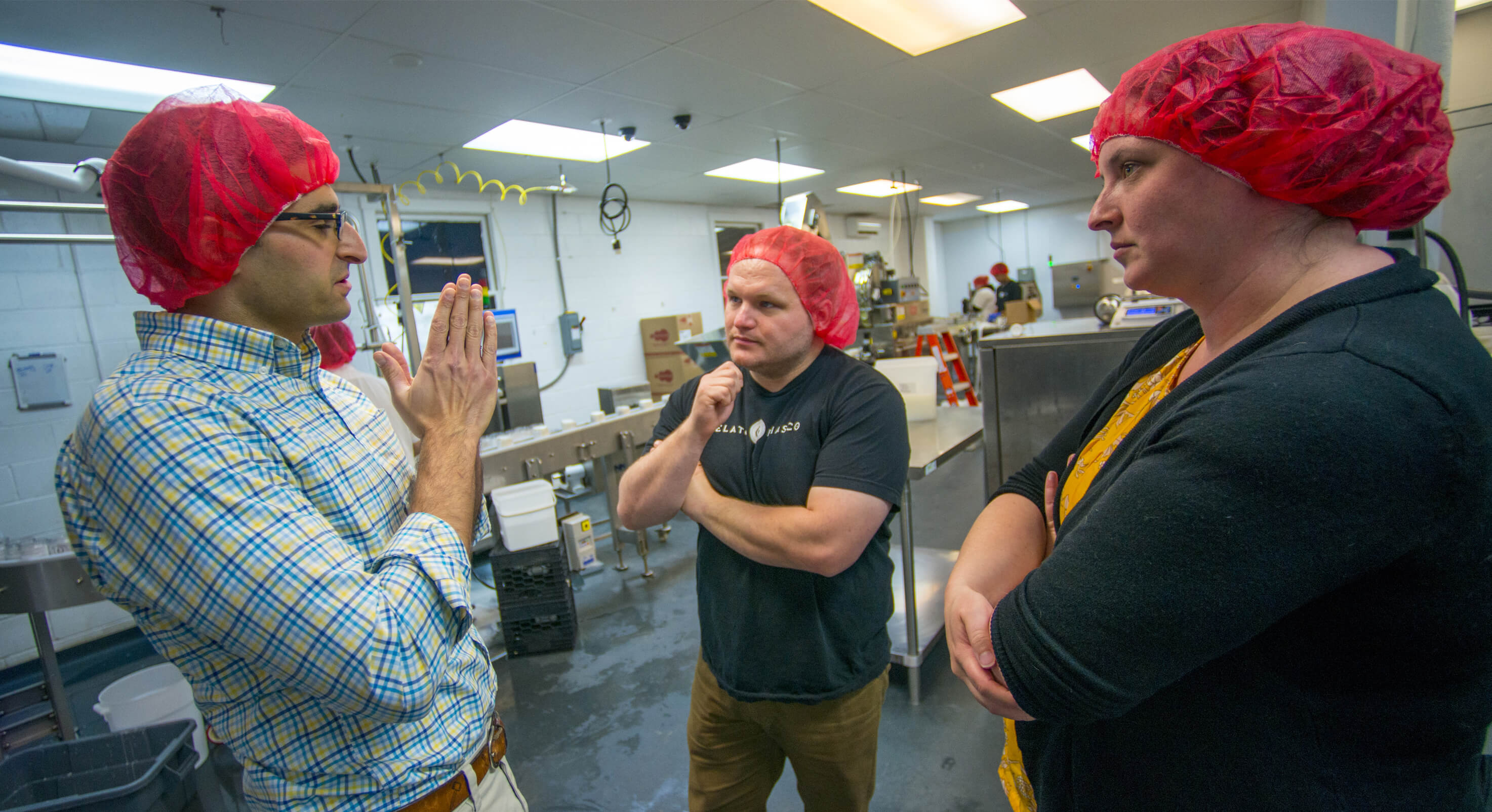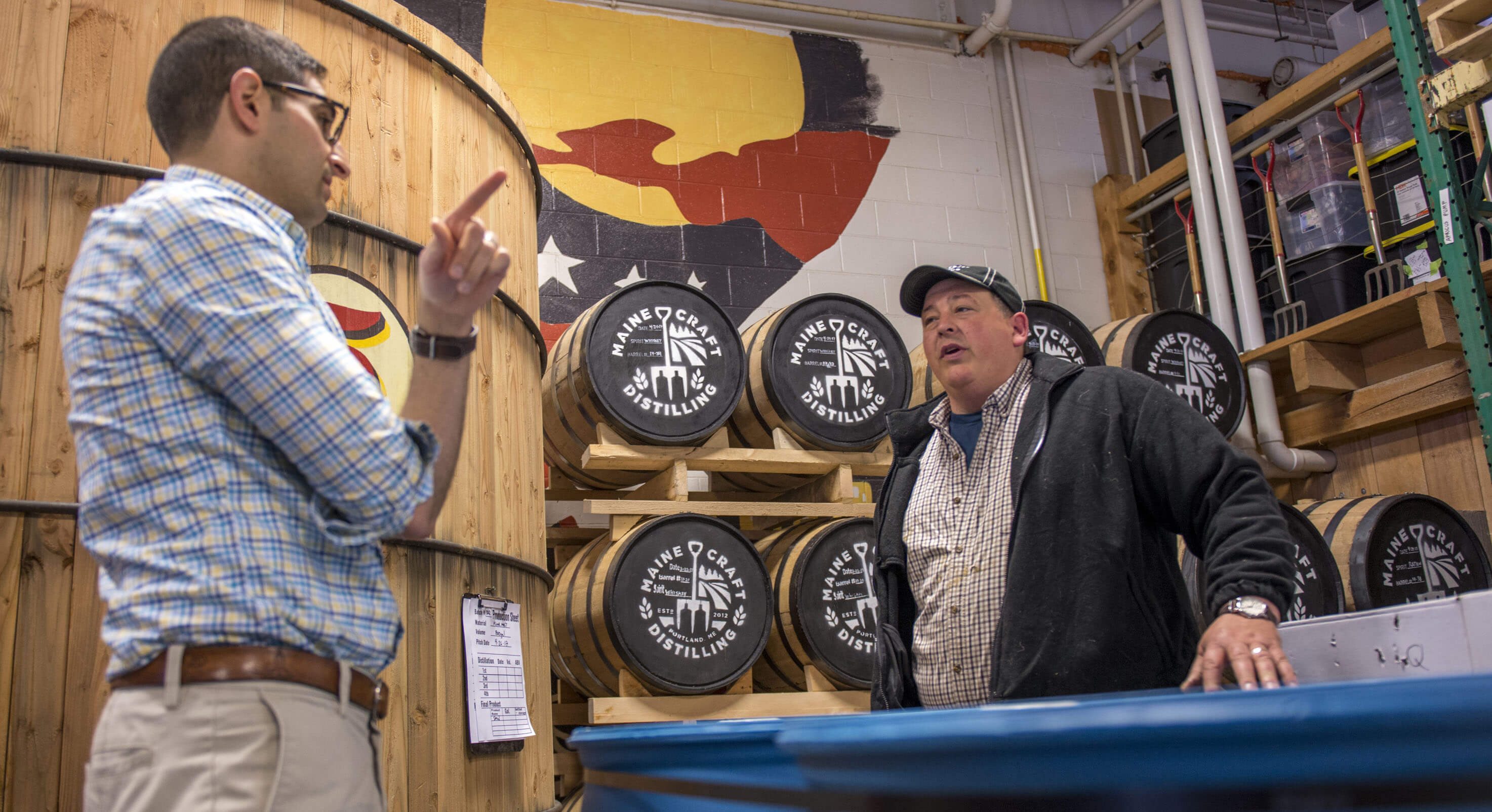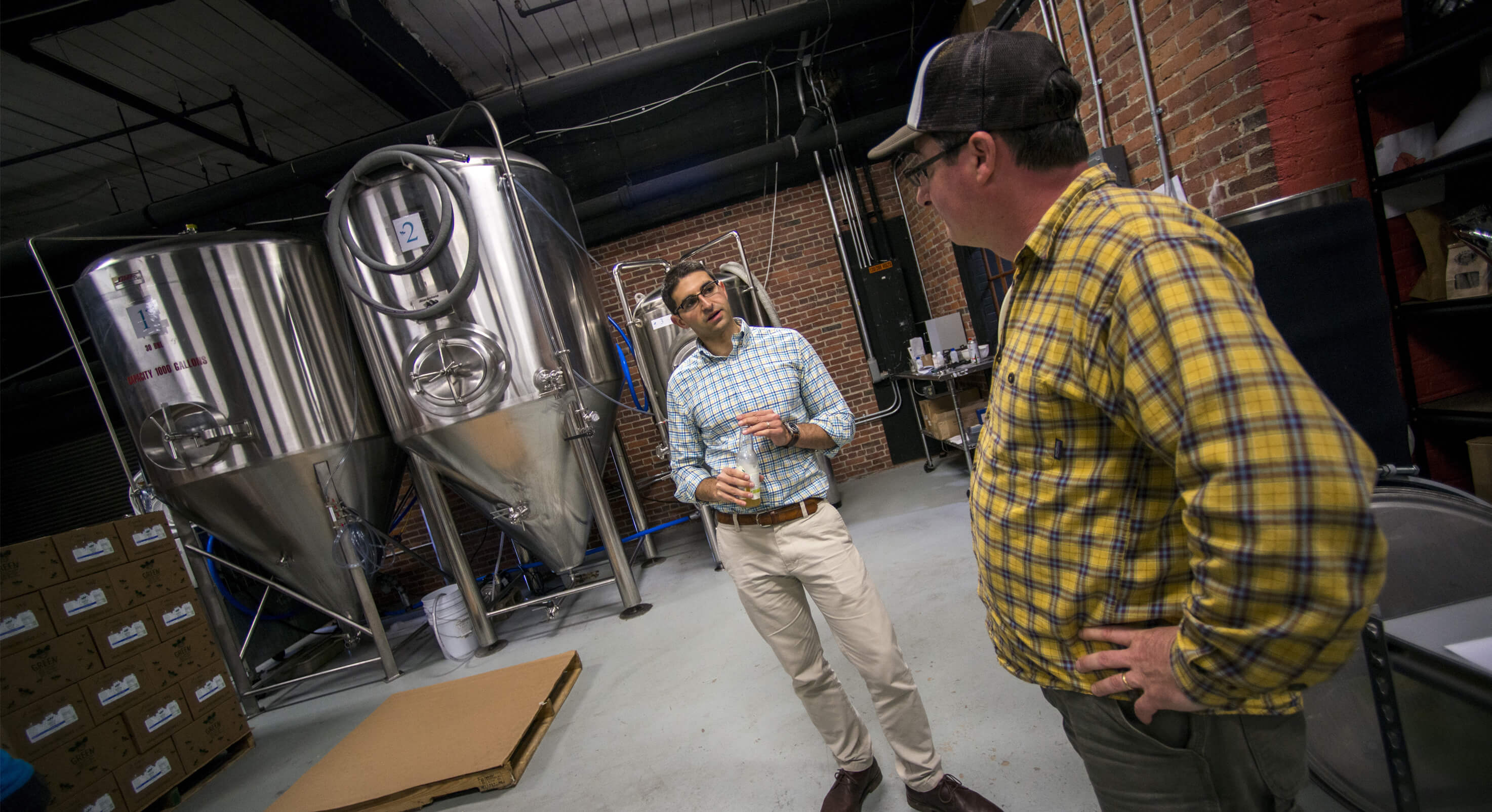Jason Bolton’s phone begins to ring at 7:30 a.m.
The first call is from a local butcher requesting information about a two-day course offered by University of Maine Cooperative Extension covering new federal food safety regulations.
The next is from the manager of one of the state’s thriving craft breweries, seeking advice on the design for a new facility and equipment needed to keep up with rising demand.
Then a community member calls to ask whether it’s safe to eat homemade pickles that have been hidden in a pantry for over a decade. (Spoiler alert: it’s not.)
Bolton, UMaine Extension food safety specialist and associate professor, never knows what query the next call will bring — from a question about what to do with cheese someone “finally found,” to a request for laboratory analysis of a new hot sauce created by a Maine-based company.
He also isn’t sure what the next office visit will bring, like the day someone stopped by with a container of glowing shrimp covered in bioluminescent bacteria.
When he’s not fielding calls and visits, Bolton is on the road, traveling statewide to work one-on-one with food and beverage entrepreneurs — both home-based business owners and managers of multimillion-dollar seafood facilities. As part of UMaine Extension’s three-member food safety team, he consults on issues ranging from facility expansion plans and best food safety practices to product development and regulatory compliance.
He also organizes professional industry courses, teaches UMaine’s popular Brewing with Food Science class and a graduate-level course on food safety preventive controls; and advises food science graduate student researchers.
Bolton is one of UMaine Extension’s go-to resource people. The research and expertise he shares makes the difference in new product development, food companies’ growth and homemakers’ peace of mind.
“Every day is different, a new opportunity to learn and meet new and exciting food entrepreneurs,” says Bolton, whose position is funded in part by the Maine Economic Improvement Fund, established by the Maine legislature in 1997 and funded through an annual state appropriation to leverage economic development through targeted investment in university-based research and development.
“I do it because I have knowledge that can help others be successful.”
There can be many hurdles to clear before a new food idea makes it to market, says Bolton, and depending on the product, some can be intense. The same goes for starting or expanding a food-related business.
First are regulatory and legal concerns, which entail getting the necessary permits and licenses. For some industries, this process can be lengthy, complex and expensive.
“There is something that is said when you produce a Maine-made product: quality, safety, hard work, a strong sense of community. Things that define the state as a whole.” Jason Bolton
Next is the facility. Both small commercial kitchens and multimillion-dollar processing plants must be designed to meet federal food safety specifications. Specialized equipment needs to be installed, processes reviewed and validated, and some products need to be lab tested before they can be sold.
Once the food product is ready, there’s the implementation of food safety controls and employee training, establishment of ingredient supply chains, packaging, labeling, storage, shipping and distribution. Business owners also need marketing and business plans, and knowledge of the day-to-day operation.
In the past seven years, Bolton has worked with more than 200 food companies in all 16 counties to help grow Maine’s food industry.
“It’s one of the few growing non-health care industries in the state,” says Bolton. “All of the industries that support these new businesses are growing and being brought up by them.
“When I started seven years ago, we only had a few lobster processors in the state. Now we have an additional four, and I’ve worked or continue to work with most of them. These are large processors, processing at least 25,000 pounds a day during the peak season.”
And of all the promising Maine-made products — pickles, sauces, ice cream, tofu, jams and jellies — one is particularly effervescent. Beer.
As of January 2017, Maine was home to 89 licensed breweries, 25 of which opened since 2015. The industry added $228 million to Maine’s economy in 2016 and its growth has outpaced the national average for five of the last six years.
“There is something that is said when you produce a Maine-made product: quality, safety, hard work, a strong sense of community. Things that define the state as a whole,” Bolton says.
On a rainy morning in Prospect Harbor, Maine, Bolton tours the Maine Fair Trade Lobster facility with Bill Jackson, the production manager. The plant is quiet with large segments of the processing line disassembled for maintenance in preparation for the start of another busy season.

When the operation is in full swing, the brightly lit and sparkling clean factory will hum as more than 150 employees handle hundreds of thousands of lobsters from one end of the production line to the other.
Bolton knows this facility. Years ago as a UMaine undergraduate, he visited what was then Stinson Seafood Cannery, one of the last canneries in the country, and watched a team of older women deftly pack tins of sardines. The next time he saw the facility was in 2010, when the new owners, Live Lobster Co., wanted help retooling the century-old cannery into a state-of-the art processing plant.
Bolton came in on the ground floor.
By the time East Coast Seafood and Garbo Lobster purchased the plant and started MFTL three years later, Bolton knew the place inside out and offered MFTL recommendations on equipment, meeting state and federal regulations, safety training for employees, and more.
“I fully believe in the Extension mission to bring UMaine research and information to the public. In my case, it is to help grow food companies and ensure they are properly educated to manufacture safe foods.” Jason Bolton
In the years since, MFTL has produced upward of 8 million pounds of lobster annually with a value of over $36 million, says Tad Pawlowski, quality control director. The lobsters are harvested by local fishermen from the Gulf of Maine and Atlantic Canada. The frozen lobster products are shipped worldwide.
Jackson says Bolton’s food safety experience, expertise and advice have been incredibly helpful.
“We aim to be leaders in terms of processing excellence and quality assurance. His input has been invaluable as we continue to grow and provide meaningful employment to the state of Maine,” says Jackson.
Bolton is no stranger to the state’s most iconic sea-bug. His uncle, Robert Bayer, directs the Lobster Institute at UMaine and inspired Bolton to move to Maine from Arizona to study food science.
In 2006, Bolton earned a bachelor’s degree in food science and human nutrition at UMaine.
“Coming from Arizona, Maine was a new place and a new culture, but the opportunities at UMaine gave me a huge leg up in my overall confidence and abilities,“ says Bolton, who as an undergraduate was a teaching assistant in both biology and chemistry, and collaborated on research projects with faculty and staff. He also was a National Science Foundation Teaching Fellow, leading STEM classes at local elementary schools.
For his undergraduate thesis in food science, Bolton quantified the heavy metal content in lobster meat and tomalley, the liver-like organ that is a delicacy in some brave Maine circles.
Bolton stayed at UMaine for a master’s and Ph.D. in food science and human nutrition.
He developed a noninvasive, handheld device to analyze optical properties of the protein hemocyanin, or lobster blood, which is correlated with lobster health and vitality.
The sensor informs distributors about the health of a live lobster prior to shipping and its ability to survive long-term storage on its way to consumers.
Bolton continued the development of the sensor as he began his Ph.D. as the principal investigator of a $98,000 National Science Foundation grant.
For his doctoral research, Bolton designed analytical methods to rapidly identify, quantify, isolate and extract small molecules in foods — proteins in lobster blood, polysaccharides in aloe and potent antioxidants in peppers — that could be used in nutraceuticals or biotech research.
Two years into his program, he joined UMaine Cooperative Extension. Committed to the engaged student experience he had, Bolton advocates for internships, plugging undergraduates into food businesses. That includes three food safety interns at MFLT.
The interdisciplinary focus and friendly academic community sealed Bolton’s decision to begin a career at UMaine.
“I fully believe in the Extension mission to bring UMaine research and information to the public,” says Bolton. “In my case, it is to help grow food companies and ensure they are properly educated to manufacture safe foods.”
A new filling line at Gelato Fiasco was part of the 2016 expansion of the Brunswick-based company. Jason Bolton provided expertise on the sanitary design, product flow and operation.
At the Gelato Fiasco Flavor Foundry in Brunswick, Maine, freshly filled pints of Madagascar Vanilla Bean advance along a conveyor belt. On the lid of each hand-packed container, a sticker highlights the 10th anniversary of the award-winning gelato.
In the last decade, the company has created over 1,500 flavors of gelato and sorbetto, most of which are only available at the company’s stores in Brunswick and Portland. These pints of vanilla, however, are destined for grocery store freezers nationwide.
Bolton began working with Gelato Fiasco in 2015 during a period of major growth for the company.
“When we first reached out to him, we had virtually no mechanization on the production line. We were in a stage where we needed to start producing a lot more gelato quickly to fill customer orders,” says Lila Wilmerding, Gelato Fiasco’s quality control director.
Bolton helped the growing company design its new plant and build its food safety plan. With the expansion, the gelato company shifted from producing about 2,400 pints a day to nearly 12,000.

Amid the clatter of empty containers and lids feeding into the production line, Molly Delan, Gelato Fiasco’s plant manager, and Joshua Davis, co-founder and CEO, talk with Bolton about the implementation of the new Food Safety Modernization Act (FSMA).
FSMA represents a massive change in commercial food processing regulations, says Bolton, who is the lead in FSMA education and programming for the state. Under the new regulations, all food producers will be required to have specific practices and controls in place to prevent food safety issues.
“Cooperative Extension is providing the required education for these companies to meet these new mandates,” says Bolton, who also teaches courses and works with Maine companies, like Gelato Fiasco, to help them get ready for compliance.
Bolton placed UMaine food science student Olivia Conrad as an intern with Gelato Fiasco, and she helped the company start to compile required FSMA documentation.
“She exceeded all of our expectations,” Delan says. “We would give her a project hoping it would last a week and she would be back at the end of the day asking for more to do.”
Many companies want an intern with experience in food safety, says Bolton. The interns often bring valuable knowledge and become essential team members during their experience.
Gelato Fiasco hopes to hire Conrad when she graduates in 2018.
Blueshine is made with Maine-grown barley, wild blueberries and maple syrup.
Thirty miles south of Brunswick in Portland’s East Bayside neighborhood, Luke Davidson, chief distiller and owner of Maine Craft Distilling, is in the middle of moving the business to a larger facility.
Maine Craft Distilling locally sources many of the ingredients it uses to make spirits. Even its whiskey is aged on peat and seaweed from Washington County in Maine-made barrels built from Maine-grown oak.
After five years, the approximately 1,500-square-foot “farm-to-flask” distillery is bursting at the seams. Barrels racked full of finishing spirits and open-topped fermenters line the walls. And at the center of it all is the still, engineered by Davidson, dubbed “Frankenstill.”
In 2012, Maine Craft Distilling approached Bolton and UMaine Extension with questions about regulations, licensing and distillation technology.

“I was able to use less of my food safety background and use more of my food science background to help them with flavors, packaging and a few other things,” says Bolton.
Over the years, Bolton has assisted Maine Craft Distilling with its development of a few flavors, including Blueshine, a potent spirit flavored with Maine blueberries and maple syrup.
“The Maine wild blueberry is a mystical creature,” says Davidson, holding a bottle of the dark indigo fluid up to the light. “They [the blueberries] are more of an experience, and they aren’t what people normally expect.”
Bolton provided Davidson with expertise to distill, bottle and capture that unexpected experience — right down to the color.
“The Blueshine is a unique Maine product,” says Bolton. “It’s been fun to see how all of [Davidson’s] products have evolved over the years.”
The full line of Green Bee Craft Beverages includes a Maine Blueberry Lemonade, made exclusively for Luke’s Lobster restaurants throughout the United States and in Japan.
Chris Kinkade, beekeeper and founder of Green Bee Soda, began making all natural-sodas in five-gallon batches at his home in 2010. Now in a ground-floor suite in Brunswick’s Fort Andross Mill Complex, Kinkade’s honey-sweetened beverages are made in two 1,000 gallon-stainless steel tanks.
As the company began scaling up production in 2012, Kinkade contacted UMaine Extension to come up with a way to ensure consistency and develop quality-control procedures.
Bolton worked with Kinkade to validate a new production process for the sodas. He also provided training to test each batch for potential microbiological contaminants.

Over the clinking of glass and the rhythmic hiss-snap-click of the automated bottle labeler, a two-person crew packs cases with Blueberry Dream soda. Kinkade shows Bolton where new production machinery will be installed. The new equipment will allow Green Bee Soda to significantly increase daily production and further ensure the quality of the product.
“If he doesn’t know the answer, he finds the answers for us. He’s very knowledgeable and has a broad base of experience that we can tap into,” says Kinkade.
Recently, Green Bee Soda partnered with Luke’s Lobster to create an exclusive Blueberry Lemonade soda for the restaurant. Bolton connected the two after working with the restaurant’s affiliated company, lobster processor Cape Seafood in Saco, Maine. Luke’s Blueberry Lemonade will be sold at Luke’s Lobster restaurants nationwide and in Japan.
Watching Maine’s food community grow, and seeing companies he’s built relationships with succeed and share what they’ve learned with others starting out is a rewarding experience, Bolton says.
A rising tide lifts all ships.
“I try to make connections between Maine’s food companies as often as I can,” says Bolton. “I think as they grow, they can often bring others with them.”
